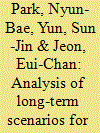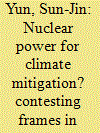| Srl | Item |
| 1 |
ID:
117244


|
|
|
|
|
| Publication |
2013.
|
| Summary/Abstract |
This paper analyzes the energy, environmental and economic influences of three electricity scenarios in Korea by 2050 using the "Long-range Energy Alternatives Planning system" (LEAP) model. The reference year was 2008. Scenarios include the baseline (BL), new governmental policy (GP) and sustainable society (SS) scenarios. The growth rate of electricity demand in the GP scenario was higher than that of the BL scenario while the growth rate in the SS scenario was lower than that of the BL scenario.
Greenhouse gas emissions from electricity generation in 2050 in the BL and GP scenarios were similar with current emissions. However, emissions in 2050 in the SS scenario were about 80% lower than emissions in 2008, because of the expansion of renewable electricity in spite of the phase-out of nuclear energy.
While nuclear and coal-fired power plants accounted for most of the electricity generated in the BL and GP scenarios in 2050, the SS scenario projected that renewable energy would generate the most electricity in 2050. It was found that the discounted cumulative costs from 2009 to 2050 in the SS scenario would be 20 and 10% higher than that of the BL and GP scenarios, respectively.
|
|
|
|
|
|
|
|
|
|
|
|
|
|
|
|
| 2 |
ID:
112465


|
|
|
|
|
| Publication |
2012.
|
| Summary/Abstract |
Korea has been one of the most aggressive countries pursuing nuclear power expansion, ranking in the top five nations globally for the installation capacity of nuclear power plants, nuclear power generation, and the number of reactors in operation. Even after the Fukushima accident, the Korean government has made no policy changes in regards to nuclear power, and public support for nuclear power remains relatively high. This study focuses on the role of the mass media in representing the Korean government's benefit-oriented nuclear frame and the persistence of public support in the country for nuclear power. The study further aims to answer the following questions: What kind of frame was mobilized by the mass media? What kinds of speakers were chosen by the media to represent a particular side to the issue? A total of three conservative, progressive, and business newspapers were analyzed. The benefits and/or risks of nuclear power in the context of climate change were major topics in the three newspapers. The benefit and risk frame constructed in these three newspapers was characterized as "slightly risky but significantly beneficial" in the conservative Chosun Daily and MK Business and "seemingly beneficial but intrinsically risky" in the progressive Hankyoreh. Different frames were contested in the three newspapers; however, because the influential power of Korean progressive newspapers is weak, arguments supporting the growth and benefits of nuclear power have become pervasive in Korea.
|
|
|
|
|
|
|
|
|
|
|
|
|
|
|
|